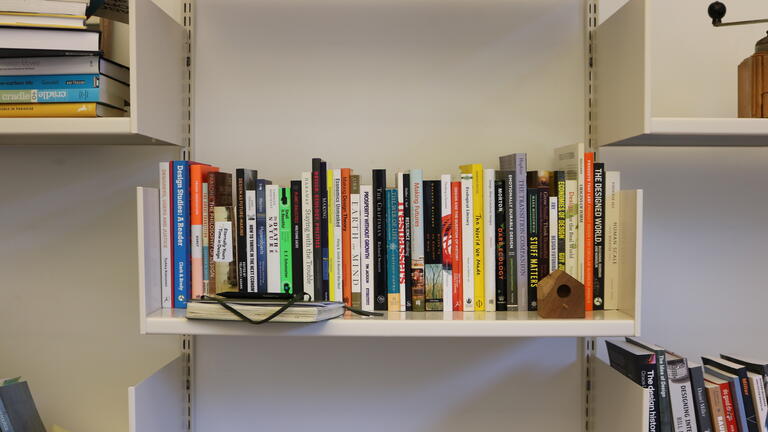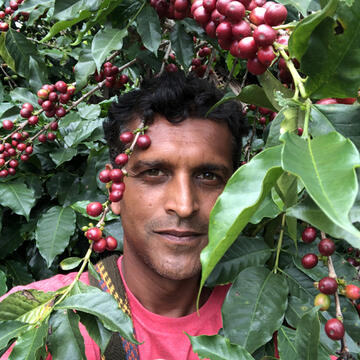
PhD in Transition Design
Fundamental change at every level of society is needed to address the issues confronting us in the 21st century. From climate change, loss of biodiversity, and depletion of natural resources, to systems of oppression, inequality, and inequity, Transition Design tackles these kinds of complex, wicked problems.
Jump To...
About our PhD Program
The PhD in Transition Design is for people committed to making a positive change in the world. Our unique program develops future design leaders with the capacity to envision and realize purposeful change across a range of complex systems—from food, water, materials and products, to policy, culture, economy, cities, and social movements. Transition Design acknowledges that we are living in transitional times, takes as its central premise the need for societal transition (systems-level change) to more just, equitable, and sustainable futures, and argues that design and designers have a key role to play in these transitions. This kind of design is connected to long horizons of time, pluriversal perspectives, compelling visions of desired futures, and must be based upon new knowledge and skill sets. Research in Transition Design, while grounded in systems thinking, can also be undertaken from the perspective of many areas of interest—circular economies, commoning, decoloniality, sociotechnical transitions, public policy, stakeholder participation, and futuring, to name a few.
Complex challenges must be addressed through ecologies of interventions that draw on multiple design specialisms, alongside expertise from other disciplines. In this way, Transition Design is a transdisciplinary field that unites researchers from within and beyond Design. This involves service designers, social designers, communication designers, product designers, environments designers, and design historians, working alongside ecologists, anthropologists, philosophers, economists, and political scientists.
Our PhD researchers develop their own research interests within the broad framework of Transition Design. We practice a collective, rather than competitive approach to creating a strong cohort. Program faculty and researchers alike operate as one supportive community with the shared goal of producing transformational work that matters. Throughout the program, you will maintain fluid interactions between theory and practice, through critical engagements with texts, images, media, objects, and experiences. The program is designed to encourage a supportive, critical research culture in which students, their peers, and advisory committees work closely together to shape new knowledge. As a PhD Researcher at CMU, your research will directly shape the development of this dynamic and emerging field.
The School of Design at Carnegie Mellon is a top-ranked Design School, situated at the heart of a world-leading research university, with a thriving undergraduate, graduate and doctoral student community. Upon completing the PhD, graduates are equipped to drive design-led systems-change through academic posts in leading universities and take on influential roles in nonprofit organizations, business, and government. Recent graduate destinations have included the University of Technology Sydney, New York University, Microsoft, University of Michigan, and Northeastern University.
Program Structure
The program has two key stages: the first is taught (year 1); the second comprises a self-defined project developed in consultation with an advisory committee (years 2–4). Where schedules permit, our students can take electives from across Carnegie Mellon's rich and diverse curricular offering.
The core curriculum is as follows:
-
Advancing your understanding of how research from diverse disciplinary domains can inform new kinds of research and practice. Through this 15-week course, you will explore the intersections of theory, practice and praxis, to develop a holistic understanding of research as a reflexive theoretical and practical process. Coursework includes the design of praxis methods to shape your own research. Topics include: research of design, research for design, research by design, and design praxis.
-
"Teaching Design" focuses on planning, conducting, reviewing, and revising learning experiences in academic and professional contexts. Students will study learning theories and instructional design approaches, probing their value to design education. Students will investigate traditional and emergent approaches to instruction through readings and discussions situated in the realm of cognitive studies, neuroscience, learning science, instructional design, and educational pedagogy. Students will discuss challenges that are common to design, which they will use to brainstorm ways of effectively addressing obstacles that they are likely to encounter when teaching. Students will apply their discoveries to the design of learning objectives, outcomes, instructional activities, performance measures, formative assessments, and summative evaluations, to create innovative and effective teaching and learning experiences based on a context they define. The course will culminate in the design of concrete teaching plans that may take the form of syllabi, project briefs, class exercises, assessment tools, and evaluation metrics.
-
An “ecoliterate” mindset is the starting point for Transition Design. Indeed, to be ecoliterate is to understand the principles through which natural systems flourish and to apply these principles to society, so that we too may flourish without compromising or destroying the natural systems on which we depend. Spanning 7-weeks, this seminar class focuses on key themes of ecoliteracy to help us navigate our social, ecological, and existential crises. Topics include: place and bioregions, Goethean science, living systems and Gaia, relationality and context, radical holism, and everyday life and infrastructure
-
This seminar exposes students to the emergent issues in the research and practice of Design through weekly discussions with individual faculty members. Faculty primarily resident to the School of Design present their research and interests to students in 50 minute sessions; two faculty presenting one day each week. The course aims to provide masters students (and some PhD students) first-hand exposure to faculty, their research, and interests. It's also a nice way for faculty to begin meeting grad students.
-
Driving design-led, systems-level change towards socially and ecologically sustainable, convivial and equitable place-based lifestyles. Through this 15-week course, you will explore multilevel problems to establish mutually beneficial relationships between people, the natural environment and the designed world; repositioning designers as agents of sustainable change. Topics include: living systems & complex problems, mindsets & postures, theories of change, visions, and transition designing.
-
Introducing future-focused design practices with practical training in futuring and foresight methods. Through this 15-week course, you will be introduced to a broad array of future-focused design practices, coupled with practical training in futuring and foresight techniques and methods. Coursework includes the development of a "Time Machine"—an immersive, future-focussed scenario for storytelling and research activation. Topics include: world modeling, futuring & foresight, emerging design practices, criticality & speculation, design pedagogy, and sustainable futures.
-
Defining a 3-year research project with your advisory committee, geared toward activating sustainable change. Through this 7-week course, you will frame new research contexts, define questions, plan methodological approaches, design open research structures that adapt and change, and speculate upon research outcomes and their impacts. Coursework includes writing a PhD proposal. Topics include: framing research problems, building an argument, planning your project, keeping research open, and writing a research proposal.
-
Developing a 2-year period of deep, reflective and self-directed research. Across this sequence of courses—spanning 4 semesters—you work closely with your advisory committee to build upon your research proposal and literature review. During this phase, you will deepen your literature review, undertake field research, develop your practice and begin pulling together your research into a coherent body of work.
-
Deepening your connection with the craft of writing via a cross-section of academic, journalistic and creative styles. Through this 15-week course this practical hands-on course helps you develop your style, structure and confidence in design writing. Writing is framed as a creative process where ideas are explored, discovered and expressed. Coursework includes planning a literature review. Topics include: conference papers & journal articles, design criticism, podcasts & digital publishing, and transformational design curricula.
-
Creating the critical space for divergent research themes to coalesce into a clear and conclusive body of research. You will assemble your dissertation in advance of the defense in May of the final semester. Dissertations can be entirely written (60–80K words), or a body of written and practical work (40–60K words, by negotiation). Your final body of work must demonstrate an original contribution to knowledge which expands understanding of transition design.
Click here to view our PhD in Transition Design Planner, illustrating how these courses map across the 4 years of the program.
Current Researchers & Faculty
PhD Researchers
Associate Teaching Professor, PhD in Transition Design
Faculty Advisors
Toward the end of the first year, you are supported in assembling a 2-4 member advisory committee. This mentoring group comprises diverse expertise from faculty from the School of Design, from other schools across CMU, and advisors external to CMU where appropriate.
Requirements & Costs
Entry Requirements
Qualifications
Applicants should meet the following requirements:
- A Bachelor's degree from an accredited institution with a strong record of academic achievement.
- A Master's degree from an accredited institution with a strong record of academic achievement. In some circumstances, we will consider applicants without a Master's degree, where there is evidence of equivalent community-engagement, leadership, research, writing, or other related experience.
Language Requirements
All applicants whose native language is not English are required to have a valid TOEFL (Test of English as a Foreign Language), IELTS (International English Language Testing System), or the online DET ( Duolingo English Test) score in the GradCAS Standardized Test Section. All applicants must submit their highest test score by the application deadline.
- Our minimum TOEFL total score is 102, with minimum subscores of 25. In addition to single test date TOEFL iBT scores, the School of Design also accepts MyBest scores for TOEFL iBT.
- Our minimum IELTS score is 7.5
- Our minimum Duolingo score is 128 total. Subscore minimums: Literacy: 125, Conversation: 120, Comprehension: 135, Production: 105
Scores below these minimums will not be considered for admission.
Costs
Professional track candidates find their own sources of funding. This track is for domestically based people who wish to continue their employment whilst also undertaking PhD research, and keep the flexibility to study in a low-residency mode once the first year of coursework is complete. Teaching Fellowship support has been paused until further notice.
Applicants who are accepted into the program are required to pay the following tuition and fees, estimated to be $69,600 over 4-years:
Tuition
- Year 1: $45,700 (2025-2026)
- Year 2: $6,486 (2026-2027)
- Year 3: $6,625 (2027-2028)
- Year 4: $6,764 (2028-2029)
(Tuition for years 2-4 are equivalent to 14% of the base tuition for the year)
University fees (annual estimates)
- Activity Fee: $244
- Technology Fee: $480
- Transportation Fee: $282
Note: CMU policy requires candidates to have individual health insurance estimated individually at $3,000 per year.
Application
Application
The GradCAS application for admissions will be available December 2025 until February 28. Click Here.
Further Information
Please feel free to email us with any questions. You can also check out our FAQs page. As this is a relatively new program, insufficient data exists to provide helpful transparency statistics. This will be shared as it becomes available.












